Duterte a Marcos copycat — SF Sept. 20 protesters
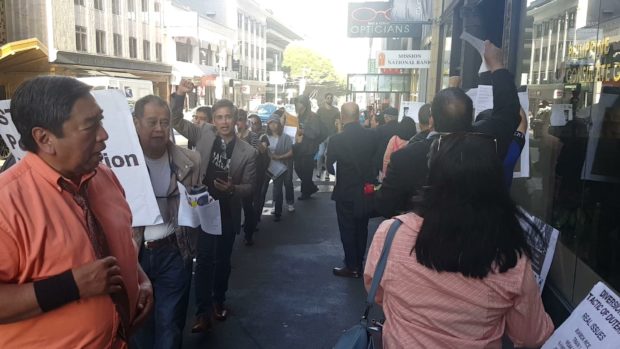
Protesters, including Atty. Rodel Rodis (in orange polo shirt) and Donnie de Leon (with fist in the air), march in circle chanting anti-Martial Law slogans. INQUIRER/Jun Nucum
SAN FRANCISCO — Anti-martial law protesters commemorated the “dark days” of Martial Law under former President Ferdinand Marcos and denounced the allegedly looming dictatorship of President Rodrigo Duterte, calling him a Marcos copycat.
Dozens of protesters mostly from Filipino Americans Human Rights Alliance (FAHRA), marched in circle in front of the Philippine Consulate on Sept. 20, chanting “When human rights are attacked, stand up fight back,” “Duterte Dictatorship Hell No No Way,” “Women will defeat you,” and “Marcos Hitler Duterte Diktador Diktador.”
Names of alleged victims of Marcos Martial Law and victims of Duterte’s anti-drug campaign usually dubbed as collateral victims of extra-judicial killings (EJK) were read out by the response “No Justice No Peace!” before roses were offered in front of a lighted candle for the victims mentioned. Protesters also tore pictures of then-President Ferdinand Marcos and his son, Bongbong, before ending the rally.
Among victims on the list were Lillosa Hilao, Lorena Barros, Archimedes Trajano, sixteen-year-old Boyet Mijares, Ishmael Quimpo, Ferdie Arceo, Jessica Sales, Maria Leticia Pascual Ladlad, fourteen-year-old Reynaldo de Guzman, Mark Angelo Arnaiz, Kian de los Santos, U.S.-based Silme Domingo and Gene Viernes, Macliing Dulag, Lean Alejandro, and Senator Benigno Aquino Jr.Amnesty International estimated 3,400 were killed, 35,000 were tortured and 70,000 were incarcerated during the Marcos Martial law period.
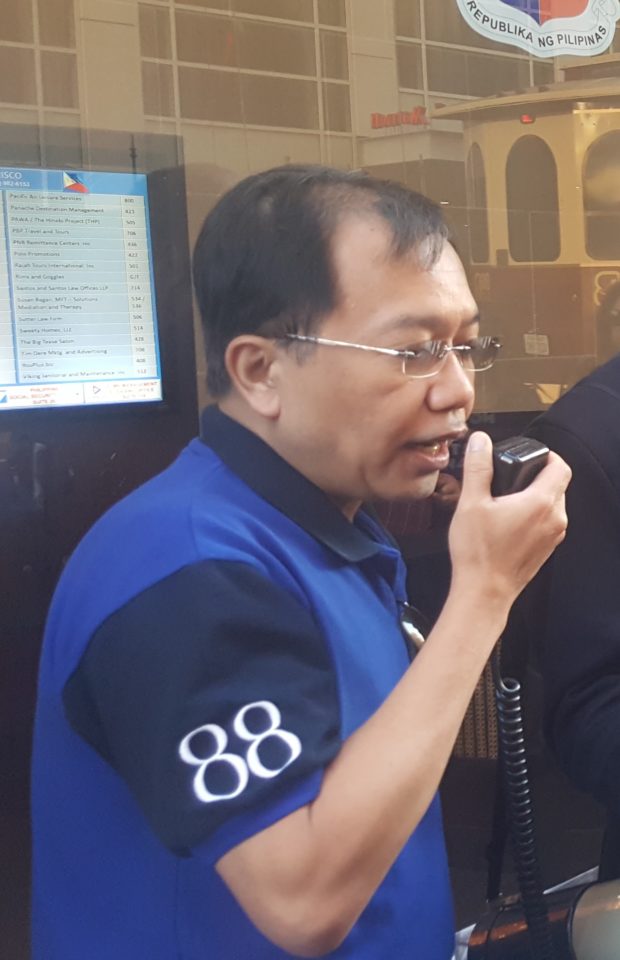
Atenean Villamor Bong Espiritu is “ready for the new struggle against dictatorship for the next generations of Filipinos.” INQUIRER/Jun Nucum
FAHRA’s Donnie de Leon enumerated the ways how anti-government protesters were tortured after being rounded up.
“During this dark chapter of Philippine history, thousands of people were subject forms of torture. Prisoners were electrocuted, beaten up and strangled. They were burned with flat iron or cigars. Women were stripped naked and raped. Various objects were forced into their genitals. We say never again, never again to Martial Law,” de Leon recounted.
Veteran San Francisco Bay Area anti-Martial Law activist Rodel Rodis recalled that they were already preparing for eventualities as then-President Marcos had suspended the writ of habeas corpus, arresting people without charges.
“We were organizing as we have to be prepared for that eventuality. So, on the day Martial Law was declared in the Philippines, we, while on our convoy of five cars was crossing Golden Gate bridge, heard over the news Friday afternoon (PST) that Martial Law was declared Saturday September 22 a no-school day so students could not organize in protest. So, we met and decided to focus on urging the U.S. Congress to cut off military and economic aid to Marcos, but it took fourteen years before Marcos was ousted,” Rodis reminisced.
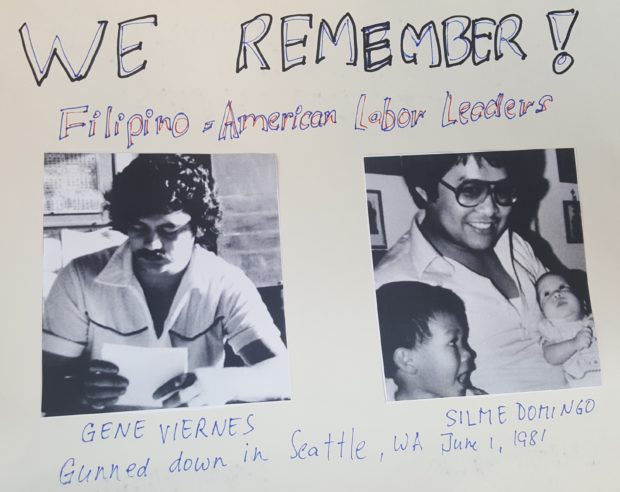
Gene Viernes (left) and Silme Domingo (right) were proved murdered in Seattle on June 1, 1981 by local operatives of then-President Marcos. INQUIRER/Jun Nucum
“It saddens me that a Catholic country would not stand up against a dictatorship that is murdering people left and right and allowing the murderers get away with it,” rued Cindy Domingo who was visiting from Seattle. Her brother, Silme, was murdered in Seattle in 1981 together with fellow unionist Gene Viernes by hitmen now serving life sentences who were led by a union leader (he died in prison) who was close to Marcos.
De La Salle University (DLSU) alumnus Edwin Batongbacal admitted that the opposition to President Duterte, is just beginning.
“This is time for us to show up and we should do this many, many more times because of what is happening in our country. Duterte is committing impunity, weaponizing the executive branch of government, trying to control Congress, and has intimidated the Supreme Court,” Batongbacal contends.
Villamor Bong Espiritu, an Ateneo de Manila University alumnus, who was five years old when Martial Law was declared and whose interest in knowing about Senator Benigno Aquino Jr. and what he stood for started when Aquino was shot dead in 1983, said that the struggle waged in EDSA 1986 is still not lost on him.

Veteran activist Geline Avila laments that the failure of the education system to inculcate the lessons of the Marcos years contributed much to the current political situation in the Philippines. INQUIRER/Jun Nucum
“That early, we attended many rallies after we walked out of our classrooms in Ateneo. Our teachers and priests all supported us,” shared Espiritu. “Here we are again as many have seem to have forgotten. Now we are in a new struggle and we are ready to do this again for the next generations of Filipinos. This is moral struggle that we won’t back out from. Duterte is just a second Marcos and a Marcos copycat.”
Ateneo de Manila University Fr. Jose Ramon Villarin SJ and De La Salle University president Br Raymundo Suplido FSC on the eve of the 46th year of the Declaration of Martial Law issued a joint statement to fight attempts to forget and simply gloss over abuses and horrors of and instead remember Martial Law.
Another veteran anti-Martial Law activist Geline Avila, said, “It also a failure of our educational system that it’s easy for people to believe Duterte when he says let go of human rights because you cannot eat them anyway. So, it is urgent that we really fight for our memory because what kind of a people are we if we lose our memory and not have a sense of who we are.”
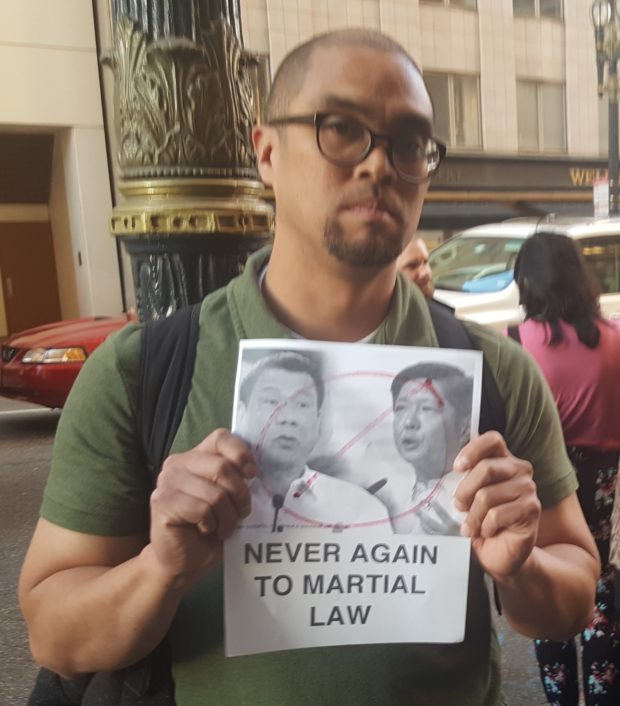
College professor of Asian American studies Eugene Gambol believes that the mass actions are needed in bringing political awareness to the Filipino community in the United States. INQUIRER/Jun Nucum
National Alliance for Filipino Concerns (NAFCON)’s Eugene Gambol, a professor at the San Francisco City College and at San Francisco State University, said he was inspired to become a professor and pursue higher education to teach about Philippine-American history after first learning about organizations in the Bay Area, specifically the Katipunan ng Demokratikong Pilipino (KDP), and the ways in which they resisted Ferdinand Marcos.
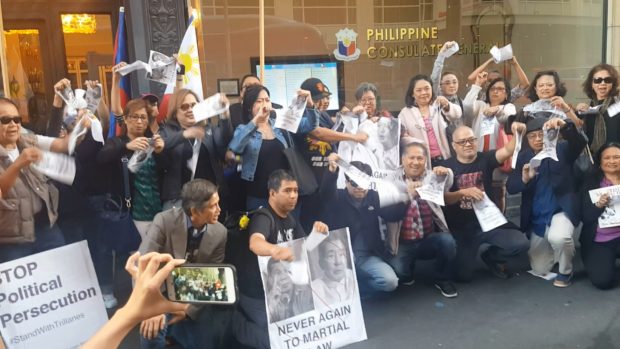
Protesters tear President Marcos and son Bongbong’s pictures in the culmination of the anti-Martial Law protest in front of the Philippine Consulate. INQUIRER/Jun Nucum
“The mass actions here are not only effective, but also the only way to bring awareness into the broader Filipino community here in the United States, especially because the current American president is very supportive of Duterte. It is important that we should be aware where our tax money goes,” Gambol said.







